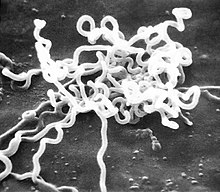Rapid plasma reagin: Difference between revisions
No edit summary |
BiObserver (talk | contribs) m Fixing style/layout errors |
||
| Line 1: | Line 1: | ||
[[Image:TreponemaPallidum.jpg|thumb|''Treponema pallidum'', the bacterium that causes [[syphilis]].]] |
[[Image:TreponemaPallidum.jpg|thumb|''Treponema pallidum'', the bacterium that causes [[syphilis]].]] |
||
The |
The '''Rapid Plasma Reagin''' ('''RPR''') refers to a type of [[rapid diagnostic test]] that looks for non-specific [[antibody|antibodies]] in the blood of the patient that may indicate that the organism (''[[Treponema pallidum]]'') that causes [[syphilis]] is present. The term "reagin" means that this test does not look for antibodies against the actual bacterium, but rather for antibodies against substances released by cells when they are damaged by ''T. pallidum''. |
||
In addition to screening for syphilis, an RPR level (also called a "[[titer]]") can be used to track the progress of the disease over time and its response to therapy. |
In addition to screening for syphilis, an RPR level (also called a "[[titer]]") can be used to track the progress of the disease over time and its response to therapy. |
||
Revision as of 14:31, 2 June 2015

The Rapid Plasma Reagin (RPR) refers to a type of rapid diagnostic test that looks for non-specific antibodies in the blood of the patient that may indicate that the organism (Treponema pallidum) that causes syphilis is present. The term "reagin" means that this test does not look for antibodies against the actual bacterium, but rather for antibodies against substances released by cells when they are damaged by T. pallidum.
In addition to screening for syphilis, an RPR level (also called a "titer") can be used to track the progress of the disease over time and its response to therapy.
Accuracy
The RPR test is an effective screening test, as it is very good at detecting people without symptoms who are affected by syphilis. However the test may suggest that people have syphilis who in reality do not (i.e., it may produce false positives). False positives can be seen in viral infections (Epstein-Barr, hepatitis, varicella, measles), lymphoma, tuberculosis, malaria, endocarditis, connective tissue disease, pregnancy, autoimmune diseases, intravenous drug abuse, or contamination. It can also occur naturally in the elderly.[1] As a result, these two screening tests should always be followed up by a more specific treponemal test. Tests based on monoclonal antibodies and immunofluorescence, including Treponema pallidum hemagglutination assay (TPHA) and Fluorescent Treponemal Antibody Absorption (FTA-ABS) are more specific and more expensive. Unfortunately, false positives can still occur in related treponomal infections such as yaws and pinta. Tests based on enzyme-linked immunoassays are also used to confirm the results of simpler screening tests for syphilis.
Alternatives
Another test often used to screen for syphilis is the Venereal Disease Research Laboratory VDRL slide test. However, the RPR test is generally preferred due to its ease of use.
Other types of tests are currently being evaluated as possible alternatives to, or as replacements for, the rapid plasma reagin test. One of these alternatives is an immunochromatographic strip test. A study published in February 2006[2] found that this test outperformed the RPR test in values of sensitivity and specificity, and it does not require a laboratory to process the results.
Fluorescent Treponemal Antibody Absorption Test is the most specific test for syphilis. If this is positive it confirms the diagnosis.
References
- ^ Pickering, Larry K., ed. (2006). "Syphilis". Red Book: 2006 Report of the Committee on Infectious Diseases. American Academy of Pediatrics. pp. 631–644. ISBN 1581101945. OCLC 70819143.
- ^ Montoya PJ, Lukehart SA, Brentlinger PE; et al. (February 2006). "Comparison of the diagnostic accuracy of a rapid immunochromatographic test and the rapid plasma reagin test for antenatal syphilis screening in Mozambique". Bull. World Health Organ. 84 (2): 97–104. doi:10.1590/S0042-96862006000200009. PMC 2626525. PMID 16501726.
{{cite journal}}: Explicit use of et al. in:|author=(help)CS1 maint: multiple names: authors list (link)
- Jameson JN, Kasper DL, Harrison TR, Braunwald E, Fauci AS, Hauser SL, Longo DL (2005). Harrison's Principles of Internal Medicine (16th ed.). New York: McGraw-Hill Medical Publishing Division. ISBN 0-07-140235-7.
{{cite book}}: CS1 maint: multiple names: authors list (link) - Sacher, Ronald A.; McPherson, Richard A.; Campos, Joseph M.; Widmann, Frances K. (2000). Widmann's Clinical Interpretation of Laboratory Tests (2nd ed.). Davis. ISBN 978-0-8036-0270-0. OCLC 42890290.
